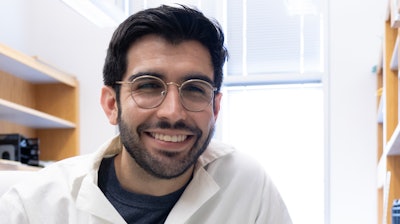 Gavin Gonzales
Gavin Gonzales
“I found that I was constantly happy doing what I was doing,” Gonzales said. “Reading papers was fun, taking classes was fun. It just felt rewarding to solve problems and put the larger picture together.”
Looking to find out more, he sent emails to 10 Duke professors, asking about the biomedical program, and seeing if he could meet students in it.
“I was amazed at how cool and how different the research in biomedical engineering was,” he said. “I could use a lot of the fundamental skills that I learned in my undergraduate degree in physics and apply them to solve a problem that would end up helping people.”
In the future, Gonzales’s research might allow older people the continued ability to walk. He’s designing a new injectable lubricant that can both bind to cartilage and protect it from degenerating, thus limiting the progress of osteoarthritis. At the same time, Gonzales is working on a joint-on-a-chip device that can simulate the natural motions that knee joints experience when a person is walking or running. This will help scientists better understand the impacts of compression on cartilage health and allow them to optimize the lubricant.
“How we can keep people moving as they age is a challenge on a societal level,” said Dr. Melissa Bostrom, assistant dean for graduate student professional development at Duke University. “[Gonzales] is really positioned to make an impact on aging adults with his research.”
Gonzales’s journey through graduate school was not always easy. It was difficult to transition from physics to biomedicine, and the COVID-19 pandemic was raging.
“I don’t think I went home for a whole year,” Gonzales said. “Being very far away from my family when a lot of people are getting sick, that was very difficult.”
Gonzales said he also felt isolated. He said that it was hard to be away from people with similar backgrounds. But he became friends with other students from the Sloan Scholar Program, which helps students from underrepresented backgrounds in the physical sciences and engineering.
“They had a very strong community of scholars with similar backgrounds who have been able to support me through these times,” Gonzales said. “I’ve been very fortunate.”
Gonzales wants to make sure that other students have the same opportunities that he has, so he’s working to re-establish a Hispanic graduate student organization at Duke. He has also been a peer mentor in the Sloan Scholar program, helping students in different departments and cohorts connect with each other. On top of that, he mentors master’s degree students and undergraduates and has worked with high school and middle school students.
“Gavin really distinguishes himself through his commitment to service and to leadership,” said Bostrom. “Sometimes students will take on a leadership opportunity because they want the line on their CV, but that’s not what Gavin is doing. He’s doing it because he really cares about everyone involved having a positive experience.”
Bostrom also praised Gonzales’s maturity and ability to work well with administrators.
“You don’t always see that with students,” said Bostrom. “He’s very respectful, very diplomatic, [and he] looks for solutions. He’s also super-humble and comes with a sense of curiosity to everything he does. He’s a wonderful exemplar of a graduate student.”





















